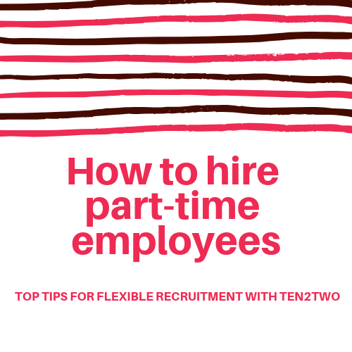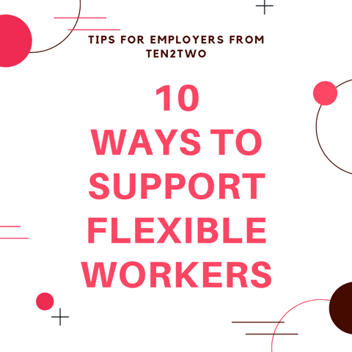How to Promote Good Mental Health in the Workplace
This World Mental Health Day, many employers will be considering employee wellbeing and what they can do to promote good mental health in the workplace. Here at Ten2Two, we feel it’s also a good time to think about flexible working in this context.
Businesses know that flexible working is a key way to help assist employee wellbeing. But there are cases where the opposite can also be true. Some part-time workers report that they are still trying to do too much in their working hours in the same way they did when they were contracted on full-time hours.
The stress of juggling it all
For working mums, sometimes the balance can tip in the other direction and mental exhaustion can set in. This can lead to employee burn out and workplace absence. In some cases, it could even lead to the employee going off long-term sick or resigning.
The fact is, there’s a lot to remember when you’re a working parent and without the flexibility in place to help you find that work-life balance, mental health can begin to suffer. And that helps no one. Employees often feel unable to talk about this in case they are viewed as unreliable. After all, there can be an expectation that flexible workers should be ‘grateful’ for the flexibility.
Part-time and mental burn out
For part-timers, there’s a view that their day or days off should be the time they get to focus on their home life and therefore, they should be rested and happy workers. But often, those days are used on their ‘other job’, namely parenting. So it’s wrong to think that part-timers can’t also suffer from burn out. Add into the mix ageing parents and you may even begin to find that middle-aged workers are being squeezed in many directions.
Here we explore what you can do as an employer to ensure your flexible workers maintain good mental health in the workplace.
1. Check in with your flexible employees
When you offer an employee flexible working, be aware that flexible needs can change. Is the flexibility working for both parties? Or does your employee need to adjust their hours somehow? Sometimes you’ll find that as a manager, an employee wants to increase their hours again.
If you regularly check in with employees, you will know how they are feeling and they will equally be able to come to you with any concerns before their wellbeing is impacted.
2. Are flexible employees working overtime at home?
Flexibility works as long as employees are sticking to the agreement and not putting in ridiculous long hours once they get home and they’ve put their kids to bed, for example. That can be more than stressful and means that you may need to rethink their job specification or assign tasks to other members of staff to alleviate the employee’s work load.
From a business point of view, unnecessary over time can lead to financial issues when you come to billing work and finding you have employees spending far longer on projects than originally agreed. Again, if you have open lines of communication with the flexible employee, you’ll get a good overview of how their role is working for them.
3. Are employees able to ask for flex on top of flex?
Of course, there will be times when all of your employees need additional time out for ad hoc medical appointments or school meetings and assemblies.
Does your flexible employee feel about to ask for that extra time? Ensure you have a policy in place about all staff needing time out of the office for these kinds of demands – if they feel bad about asking, they may end up missing crucial events and that could also harm their mental wellbeing. Should staff make up the time or will you trust their performance will actually be improved by having this flexibility in place?
4. Do you have a clear leave policy in place?
It’s essential to have clear guidelines in place when it comes to annual leave, but also ensure you have given unpaid leave a consideration. Employees have the right to take leave in case of emergency with a dependent. But employers don’t have to pay this time. Parental leave is also allowed but it is unpaid for up to four weeks for each child.
Equally, it can help flexible employees with children to know they can take their holiday entitlement during school holidays. If a role won’t allow for this because these happen to be peak business times, you need to consider this before your employee begins to struggle juggling their home commitments. Again, communication is key here.
5. Do you foster a guilt-free culture?
Ask, how does your workplace make its staff feel on a daily basis? When a manager gets up at 5.30pm and says, “Sorry guys! I’m leaving early today!”, what message is that giving employees who have no choice but to leave on time to collect children? Equally, we have heard of managers making unhelpful comments to part-time employees based on their flexible status. Comments like, “You’ll be down the list for that work trip”, and so on, just aren’t cool.
The employee probably knows this, and while they may well love the flexibility their job gives them to help them balance their work and home commitments, they may equally be frustrated that they cannot do more.
6. Do you have a presenteeism problem?
It’s hard for that employee not to feel sub-standard if your workplace routinely has employees sitting there working late every night. What can you do to alleviate this pressure and ensure people work more productively during their contracted hours?
Many companies are beginning to foster better working practices to try to boost staff productivity by cutting emails after 4pm or engaging with apps like boomerang which batch sends emails so workers can concentrate on the real work at hand.
7. Does your flexible employee feel ‘lesser’ than their colleagues?
It is so important that flexible workers are treated the same as other colleagues. Whether it’s ensuring company meetings are held at a time when everyone is in the office, through to making sure benefits and bonuses apply to all staff, employees need to feel valued.
Where this begins to grate for a lot of flexible employees is when they see colleagues promoted ahead of them, based on their full-time status, rather than their ability. Which leads us on to our next point…
8. Do you assist your employees to do their best?
As an employer, what do you do to help employees perform to their best ability? For example, if you wait all day to give an employee a brief, say at 4pm, it will be harder for them to do justice to the work when they have one eye on the clock and their energy levels may well have peaked for the day. You may also want to hold meetings earlier in the day so that everyone can focus in a relaxed and productive manner.
This is about being well organised as a manager and requires a little effort on the business’s part. But this is only equivalent to the effort required to conduct job searches and interviews when your employee walks out because they can’t manage their hours anymore.
Beat workplace absenteeism
When it comes to World Mental Health Day, mental health in the workplace is an essential factor in ensuring you have a thriving, successful workplace. If you don’t, it could cost your company greatly – and with UK businesses missing out on around £18billion in lost productivity in 2017, it’s an issue that needs taking in hand, business by business.
If you’d like to know more about Ten2Two’s flexible working consultancy, including how you can implement best working practice around flexibility, please contact Ten2Two today.
In the meantime, we wish you a positive World Mental Health Day. And remember, it’s good to talk…


 Back to resources
Back to resources 7 min read
7 min read








